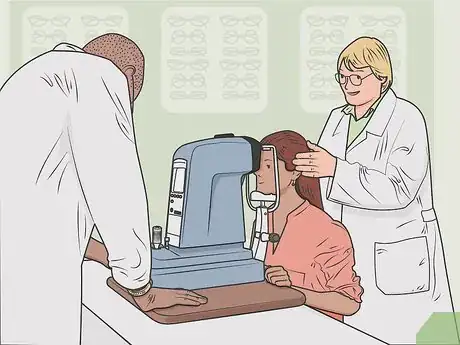This article was co-authored by Felipe Corredor. Felipe is a Senior College Admissions Consultant at American College Counselors with over seven years of experience. He specializes in helping clients from all around the world gain admission into America's top universities through private, one-on-one consulting. He helps guide clients through the entire college admissions process and perfect every aspect of their college applications. Felipe earned a Bachelor's Degree from the University of Chicago and recently received his MBA.
There are 33 references cited in this article, which can be found at the bottom of the page.
This article has been viewed 14,958 times.
To practice as an Optometrist in Canada, there are three main things you must do. First, you must obtain a Doctor of Optometry (OD) from a program accredited by the Accreditation Council on Optometric Education. Second, you must take a national examination administered by the Optometry Examining Board of Canada. And third, you must apply for and receive your license to practice from the optometry association in the province or territory in which you wish to practice.[1] Only two universities in Canada have an OD program, the University of Waterloo and the University of Montreal.[2] The University of Waterloo offers the program only in English and the University of Montreal offers the program only in French.[3]
Steps
Attending the University of Waterloo
-
1Start planning for obtaining your OD degree in high school. While you cannot apply to an OD program directly out of high school, you should start thinking about the optometry program admissions requirements at that time. Make sure you have the proper high school courses for admission to a university science degree program. Apply to a Bachelor of Science (in a Faculty of Science) degree program at a Canadian university in your last year of high school. Ensure you apply for a full-time program with five courses per term.[4]
- Community college programs cannot be used as a prerequisite for an OD program.
- You do not have to attend your undergraduate program at the University of Waterloo.
- Select a BSc program with the flexibility to choose elective courses as you’ll need to take certain courses as a requirement for application to an OD program.
-
2Take at least 3 years of a BSc undergraduate program. Ensure you enroll in and complete all the undergraduate course prerequisites for the OD program application. Also, ensure you’ve taken at least 30 courses (5 courses over 6 terms) before you expect to begin your OD program. Prerequisite courses include both science and non-science courses and are listed below. Ensure you keep an overall university average of at least 75%.[5] [6]
- You must have each of the following courses at the BSc level: English, Intro Ethics, Intro Psychology, Intro Biology (with lab) x 2, Intro Microbiology, Physiology x 2, Intro Chemistry (with lab), Intro Biochemistry, Intro Organic Chemistry, Calculus, Statistics, and Intro Physics (with lab) x 2.
- Prerequisite courses account for half the courses you take during your BSc education.
- While the minimum average for applying to the OD program is 75%, accepted students had averages between 79 and 95%.
- You do not need to complete your BSc degree to apply to an OD program.
Advertisement -
3Shadow a current optometrist for at least 8 hours. Your OD program application will require a reference from a practicing optometrist who can vouch for the fact that you’re familiar with what an optometrist does. The best way to accomplish this is to job shadow a practicing optometrist. You will need to shadow this optometrist for at least 8 hours, but those hours do not have to be done all at one time. You are also more than welcome to shadow or volunteer at an optometrist’s office for longer than 8 hours.[7]
- Consider applying for a co-op placement at an optometrist’s office in high school or during your BSc.
- As this is an application requirement, optometrists will not be surprised to have students approach them for job shadowing purposes.
-
4Write the Optometry Admissions Test (OAT) within 2 years of applying. Take the OAT within the 2 years before you apply to the OD program. For example, if you’re applying to the OD program in the fall of 2019, you must have taken the OAT between 31 Aug 2017 and 31 Aug 2019. Go to the test’s website at https://www.ada.org/en/oat/apply-to-take-the-oat to register. Ensure you’ve taken the appropriate BSc courses before taking the OAT.[8] [9]
- The OAT is administered by the Association of Schools and Colleges of Optometry for OD program admissions in the US and Canada.
- While the test is electronic, you do need to take the test at a Prometric, Inc. test centre in person.
- The OAT includes questions about biology, chemistry, organic chemistry, reading comprehension, physics, and quantitative reasoning.
- The test is approximately 5 hours in length.
- The test costs $490 USD to take. In addition, you will need to pay $40 USD for each school you’d like your test results to be sent to.
-
5Meet the citizenship requirements before beginning the OD program. For application to the OD program at the University of Waterloo, you must either be a Canadian citizen or a legal resident of Canada. This status must be valid for at least 12 months before your scheduled to start the OD program. For example, if you’re scheduled to start your OD program in Sept 2020, you must have been a citizen or legal resident since Aug 2019.[10] [11]
- Only a limited number of international students are submitted to the OD program at the University of Waterloo. Review the International Student website at https://uwaterloo.ca/international/ to determine eligibility.
-
6Take an English as a Second Language test if required. If your first language is not English, enrol to take one of the three eligible English as a Second Language tests before you submit your application. The eligible tests include the TOEFL, IELTS, and MELAB.[12] However, if you studied at an English language school for the most recent 5 years before you’re scheduled to start the OD program, you do not need to submit scores from one of these tests.[13]
- For the TOEFL (Test of English as a Foreign Language), you must have a score of at least 580 (for a paper-based test) or 237 (for a computer-based test). Plus, your essay rating must be at least 4.5 and your test of spoken English must be at least 45.
- For the IELTS (International English Language Testing System), you must have a score of at least 7.
- For the MELAB (Michigan English Language Assessment Battery), you must have a score of at least 85.
-
7Apply for admission to the OD program at the University of Waterloo. Start the application process for the OD program more than 14 months before the date you wish to start the program to ensure you have (or will have) all the admission requirements in place. For example, applications to start in Sept 2020 are due between Jul and Oct 2019. View all important due dates at the following website: https://uwaterloo.ca/optometry-vision-science/future-optometry-students/important-dates. Online applications are submitted via the Ontario Universities’ Application Centre at https://www.ouac.on.ca/. The online application will only be available during the acceptance period.[14] [15]
- You will likely be starting your third year of a BSc when you submit your application.
- You will need to submit official transcripts of your first two years of the BSc with your application.
- You will be required to submit official transcripts for both the first and second terms of your third year once those terms are complete.
-
8Take the CASPer test after you’ve submitted your application. The CASPer test is the Computer-based Assessment for Sampling Personal Characteristics test. Register to take the test on one of the dates set aside for your specific entrance date at https://takecasper.com/. For example, for Sept 2020 admission, there are only 5 test dates between Aug and Oct 2020. Ensure you have the appropriate technical requirements for taking the test.[16]
- To take the CASPer test, you will need a computer with audio, a webcam, and a reliable internet connection.
- You will need to retake the CASPer test each year you submit an application for the OD program at the University of Waterloo. Test scores cannot be reused.
-
9Obtain 2 confidential references who can vouch for you. One reference must be from a current optometrist with which you’ve job shadowed for at least 8 hours. The other reference must be from someone who can vouch for your character, such as an employer, supervisor, professor, coach, or minister. The forms required from these two references will be provided after you’ve submitted your application for the OD program.[17]
- None of your references can be family members.
- These references do not need to write a letter, they only need to complete a confidential assessment form.
- Remember to foster and maintain meaningful connections with mentors, like your professors, so they're likely to write glowing letters of recommendation for you.
-
10Self-declare any prior criminal convictions on the application. Be prepared for the fact that all students in the OD program at the University of Waterloo are required to submit a Vulnerable Sector Criminal Record Check before they begin the program. If you have been convicted of a criminal charge, you will need to meet with the School of Optometry and Vision Science Criminal Record Check Consideration Committee (CRCCC) to discuss the conviction. The CRCCC will make the final decision regarding your admission.[18]
- This criminal record check is required because you’ll be working with children and vulnerable adults as part of your training.
- You will also be required to submit an annual self-declaration form while you’re in the OD program.
-
11Attend the Meet & Greet at the University of Waterloo if invited. After you’ve submitted your application, you will receive an email from the university before the end of November. The email will either invite you to a Meet & Greet event in January or it will let you know you’re no longer being considered for admission. Go to the following website to review the travel requirements involved: https://uwaterloo.ca/optometry-vision-science/about-optometry-vision-science/directions. Attend the Meet & Greet in January.[19]
- If you’re invited to attend the Meet & Greet, you will also be required to submit an updated official transcript in January.
- The Meet & Greet consists of a personal conversation with faculty and optometrists, a roundtable discussion with current students, and a tour of the facilities.
- This will be the earliest time you’ll know if you have not been admitted to the OD program.
- The University of Waterloo only admits 90 students per year.[20]
Going to the Universite de Montreal
-
1Attend college in Quebec to obtain a Diploma of College Studies (DCS). Before you can attend university in the province of Quebec, you must first obtain a DCS. If you’re from outside Quebec but wish to study at a Quebec university without prior university experience, you will also need to obtain a DCS. The only exception is someone who has attended a non-Quebec university before applying to a Quebec university. You have 4 DCS options in Quebec for the OD program at the University of Montreal, noted below.[21] [22]
- Option 1: A 2-year pre-university DCS in Science with the objectives 00XU (biology) and 00XV (chemistry).
- Option 2: A 2-year pre-university DCS in visual orthotics plus Math 103 and 203, Chemistry 101, and Physics 101 and 201.
- Option 3: A 2-year pre-university DSC in Science and Arts.
- Option 4: A 3-year vocational DCS plus Biology 301 and 401; 2 courses in human biology; Chemistry 101, 201, and 202; Math 103 and 203; and Physics 101, 201, and 301.
-
2Ensure you meet residency requirements by the deadline. You must either be a Canadian citizen or permanent resident by the due date of the OD program application. For example, if your application is due by 15 Jan 2020, you must also be a citizen or permanent resident by this same time.[23]
- Non-citizens and non-permanent residents will not be accepted to the program.
- If you do not receive your citizenship or permanent residency status by the due date, you will have to wait to apply until the following year.
-
3Pass the CASPer exam during the OD program admission period. Register to take the CASPer exam using the website at https://examencasper.com/dates-et-frais/. Ensure you register for the exam at least 3 days in advance of the test date. Also, ensure you take the CASPer exam within the same year you’re submitting your application. No studying is required for the CASPer exam, it is an online assessment of your cross-functional competencies. Decide if you want to take the exam in English or French.[24]
- CASPer exam results are only valid for one admissions year.
- If you need to reapply to the OD program, you will also need to redo the CASPer exam.
- For 2020 admission, you must take the French exam by 10 Mar 2020 or the English exam by 5 Mar 2020.
-
4Ensure you meet the OD program’s French-language requirements. The OD program at the University of Montreal is taught only in French. Therefore, all students must pass one of three types of French language tests within the 18 months prior to the start of the OD program. One option is to take the Uniform Test of French Language and Literature at the college level. Another option is to obtain a score of at least 785/990 on the TFI. The final option is to obtain at least a C1 level in oral and written comprehension on the TEF, TCF, DELF, or DALF.[25]
- The TFI is the International French Test; more details at https://www.ets.org/tfi.
- The TEF is the French Assessment Test; more details at https://www.lefrancaisdesaffaires.fr/tests-diplomes/test-evaluation-francais-tef/tef-canada/.
- The TCF is the General Knowledge of French Test; more details at https://www.ciep.fr/tcf-tout-public.
- The DELF is the Diploma of Studies in French Language; more details at https://www.ciep.fr/delf-dalf.
- The DALF is the Advanced Diploma in French Language; more details at https://www.ciep.fr/delf-dalf/dalf.
-
5Submit an application for the OD program by the deadline. Deadlines are divided into three types; Quebec college students, Quebec university students, and non-Quebec students. Students who have only ever attended college in Quebec have a later deadline than the other two groups of students. For example, for Sept 2020 admission, Quebec college students must submit applications by 1 Mar 2020, whereas the other two types of students must submit applications by 15 Jan 2020.[26]
- Use the following website to submit your application to the OD program: https://admission.umontreal.ca/admission/depot-de-la-demande/demande-dadmission/.
-
6Attend an in-person interview at the University of Montreal if invited. Accept any interview requests you receive by the Admissions Committee at the University of Montreal. Attend the requested interview in-person, on campus. Prepare for this interview to be in French. Interview invitations are based on your CASPer exam results.[27]
- Your on-campus, in-person interview can eliminate you from consideration if it doesn’t go well.
Obtaining Your Optometry License
-
1Decide in which province or territory you want to practice. To practice optometry in Canada, you must be licensed in the province or territory where you practice. Each province and territory has slightly different requirements. However, at the very least, all provinces and territories (except Quebec, under certain circumstances) require the Canadian Assessment of Competency in Optometry (CACO) exam. Therefore, you can prepare to take the exam while deciding where you want to practice.[28]
- Once you decide upon a province or territory, go to the website for the optometry association or optometry college for that province or territory to learn the specific requirements for that province or territory.
- If you obtained an OD from the University of Montreal and you plan to practice in Quebec, you do not need to write the CACO exam.
-
2Obtain a CPR certificate if you want to practice in AB, SK, or PEI. Review the registration requirements for the provinces of Alberta, Saskatchewan, and Prince Edward Island to ensure you sign up for and receive a certification for CPR. For example, in Alberta, applicants must have their Level C Health Care Practitioner (HCP) CPR Certificate. Most CPR certifications are available through St. John’s Ambulance, the Red Cross, or other non-profits, but will require an in-person course and test.[29]
- While CPR certifications are only required in 3 provinces, you can take the proper CPR course in any province.
-
3Submit an application and the required fees to the appropriate college. Based on the instructions listed on the website for the province or territory for which you are applying, complete the required registration form and submit it–along with other required materials–back to the college or association. Include your application fee payment at the same time. For example, some colleges or associations may require a notarized photo or copy of government ID as part of the application. In other cases, the college or association may require that the application form is witnessed.[30] [31]
- Each province and territory will have a different set of fees. As an example, the cost to register in Ontario is over $450 CAD.
- In addition to the application fee, you may also be required to pay an annual membership fee for the provincial or territorial college or association. In Ontario, that cost is over $1,000 CAD per year.
-
4Send an official transcript from your OD program to the licensing body. Once you’ve decided which province or territory you’re going to practice in, request that an official copy of your post-secondary transcripts are sent to the appropriate college or association. Make this request through the University of Waterloo or University of Montreal Registrar’s Office. You may be required to pay a small fee for this service.
- In some provinces or territories, you may also need to provide a notarized copy of your OD diploma in addition to official transcripts.[32]
- An official transcript is one mailed from the university directly to the college or association. As a former student, you are not permitted to handle an official transcript.
-
5Take the Canadian Assessment of Competence in Optometry (CACO) exam. Ensure you have the following items when you’re ready to register for the exam: a passport-style colour photo; a copy of a valid passport (Canadian or foreign); a copy of a Canadian or US citizenship certificate, resident card, driver’s license, or birth certificate; and a MasterCard or Visa. Once ready, go to the OEBC’s website to register for the exam and pay the associated fee.[33] [34]
- Go to the Optometry Examining Board of Canada (OEBC) website to register for the CACO exam: http://www.oebc.ca/written-osce/exam-registration/.
- Exams can only be written in Montreal, QC or Hamilton, ON.
- The OEBC only offers the exam twice per year; in the spring and fall.
- It costs $5,100 CAD to take the exam.
-
6Pass the province’s jurisprudence exam or an info session in QC. Every province and territory, except Quebec, requires practicing optometrists to take and pass a jurisprudence exam. The exam is specific to that province/territory and the optometry college or association in that province/territory. Therefore, the college or association will register you for the exam when you submit your application or registration form. The jurisprudence exam is pass or fail only and is mainly open-book.[35]
- In some provinces and territories, you have one year from the date you submitted an application/registration to pass the jurisprudence exam.
- If you graduated from the University of Waterloo and want to practice in Quebec, you will only need to attend an information session about practicing in the province of Quebec.
-
7Obtain a criminal record check in all provinces and territories except QC. Make the request for the criminal record check within the province or territory where you’re going to practice. In some provinces, such as New Brunswick, an RCMP-level criminal record check may be required. In almost all cases, you will need a Vulnerable Sector type record check, as you will be working with children and vulnerable adults as an optometrist.[36]
- Do not apply for your criminal record check too far in advance, as in some provinces it needs to be dated no more than 6 months in advance of the date your registration is issued.
-
8Get a liability insurance confirmation letter in SK, MB, QC, PEI, and NL. If you want to practice in Saskatchewan, Manitoba, Quebec, Prince Edward Island, or Newfoundland and Labrador, you will need to provide a confirmation letter from your insurance provider that you have liability insurance. In Saskatchewan, for example, you must have at least $2 million of coverage per occurrence. If you have obtained an optometry job in one of these provinces already, it is possible that the practice where you’re working has this coverage already.[37]
- If you have not found a specific optometry job in one of these provinces, you will have to inquire how to submit insurance confirmation if you do not plan to open your own practice.
-
9Provide references if you plan to practice in NB, PEI, or NL. In New Brunswick and Prince Edward Island, have 3 eyecare-related professionals submit a confidential assessment form to the college or association on your behalf. In Newfoundland and Labrador, have 2 professionals provide letters of reference regarding your character to the college or association.[38]
- In most cases, you will need to contact the college or association’s office directly for more information.
-
10Receive your optometry license and start work as an optometrist. Once you’ve submitted all the provincial or territorial license requirements, and those requirements have been approved, you will receive your license to practice optometry. At this point, you can start to work as an optometrist in that province or territory, assuming the college or association has not requested any additional material or evidence. You can start working at an existing practice or you can start your own practice. However, starting your own practice will require a sizeable investment and additional paperwork/applications.[39]
- Refer to the Canadian Association of Optometrists’ website at https://opto.ca/ for more information on starting your own practice.
Expert Q&A
-
QuestionOther than taking the right exams and getting great test scores, what's another way for me to stand out when I want to apply for optometry school
 Felipe CorredorFelipe is a Senior College Admissions Consultant at American College Counselors with over seven years of experience. He specializes in helping clients from all around the world gain admission into America's top universities through private, one-on-one consulting. He helps guide clients through the entire college admissions process and perfect every aspect of their college applications. Felipe earned a Bachelor's Degree from the University of Chicago and recently received his MBA.
Felipe CorredorFelipe is a Senior College Admissions Consultant at American College Counselors with over seven years of experience. He specializes in helping clients from all around the world gain admission into America's top universities through private, one-on-one consulting. He helps guide clients through the entire college admissions process and perfect every aspect of their college applications. Felipe earned a Bachelor's Degree from the University of Chicago and recently received his MBA.
College Admissions Consultant Make sure to show how dedicated and driven you are with the extracurriculars you choose. For example, take part in organizations or clubs that allow you to give back to your community. You may wish to spend a certain amount of hours a week volunteering in order to demonstrate your values.
Make sure to show how dedicated and driven you are with the extracurriculars you choose. For example, take part in organizations or clubs that allow you to give back to your community. You may wish to spend a certain amount of hours a week volunteering in order to demonstrate your values.
Warnings
- If you plan to practice optometry in Quebec, but did not receive your OD from the University of Montreal, you may be required to satisfy certain French language requirements to become licensed.[40]⧼thumbs_response⧽
References
- ↑ https://opto.ca/becoming-a-doctor-of-optometry
- ↑ https://www.hhr-rhs.ca/images/Intro_to_the_Health_Workforce_in_Canada_Chapters/15_Optometry.pdf
- ↑ https://admission.umontreal.ca/en/graduate-programs/also-suitable-for-students-not-fluent-in-french/
- ↑ https://uwaterloo.ca/optometry-vision-science/future-optometry-students/about-optometry-program/high-school-students
- ↑ https://uwaterloo.ca/optometry-vision-science/future-optometry-students/admission-requirements/academic-requirements
- ↑ https://uwaterloo.ca/optometry-vision-science/future-optometry-students/admission-requirements/academic-requirements
- ↑ https://uwaterloo.ca/optometry-vision-science/future-optometry-students/admission-requirements/non-academic-requirements#OAT
- ↑ https://uwaterloo.ca/optometry-vision-science/future-optometry-students/admission-requirements/non-academic-requirements
- ↑ https://oat.ada.org/~/media/OAT/Files/oat_examinee_guide.pdf?la=en
- ↑ https://uwaterloo.ca/biomedical-sciences/admission-professional-schools/optometry-school-admission-requirements
- ↑ https://uwaterloo.ca/optometry-vision-science/future-optometry-students/admission-requirements/non-academic-requirements
- ↑ https://uwaterloo.ca/optometry-vision-science/future-optometry-students/admission-requirements/non-academic-requirements#english
- ↑ https://uwaterloo.ca/future-students/admissions/english-language-requirements
- ↑ https://uwaterloo.ca/optometry-vision-science/future-optometry-students/important-dates
- ↑ https://uwaterloo.ca/optometry-vision-science/future-optometry-students/admission-requirements/academic-requirements
- ↑ https://uwaterloo.ca/optometry-vision-science/future-optometry-students/admission-requirements/non-academic-requirements#CASPer
- ↑ https://uwaterloo.ca/optometry-vision-science/future-optometry-students/admission-requirements/non-academic-requirements#assessment
- ↑ https://uwaterloo.ca/optometry-vision-science/future-optometry-students/admission-requirements/non-academic-requirements#record
- ↑ https://uwaterloo.ca/optometry-vision-science/future-optometry-students/interview
- ↑ https://uwaterloo.ca/optometry-vision-science/future-optometry-students/frequently-asked-questions
- ↑ https://admission.umontreal.ca/programmes/doctorat-de-1er-cycle-en-optometrie/admission-et-exigences/
- ↑ https://admission.umontreal.ca/fileadmin/fichiers/documents/references_pdf/Cours_collegiaux_prealables_v5.pdf
- ↑ https://admission.umontreal.ca/programmes/doctorat-de-1er-cycle-en-optometrie/admission-et-exigences/
- ↑ https://admission.umontreal.ca/examen-casper/
- ↑ https://admission.umontreal.ca/programmes/doctorat-de-1er-cycle-en-optometrie/admission-et-exigences/
- ↑ https://admission.umontreal.ca/programmes/doctorat-de-1er-cycle-en-optometrie/admission-et-exigences/
- ↑ https://admission.umontreal.ca/programmes/doctorat-de-1er-cycle-en-optometrie/admission-et-exigences/
- ↑ https://www.ceo-eco.org/caco/
- ↑ https://www.redcross.ca/training-and-certification/course-descriptions/first-aid-at-home-courses/cpr/aed#
- ↑ https://www.cicic.ca/938/optometrists.canada?id=46
- ↑ https://oztrekk.com/licensing/practicing-optometry-in-canada/
- ↑ https://novascotia.ca/lae/fair-registration-practices/documents/FRPA-Review-Report-2018-NSCO.pdf
- ↑ https://www.ceo-eco.org/caco-registration/
- ↑ https://www.optometrystudents.com/canadian-vs-american-board-exams/
- ↑ https://uwaterloo.ca/optometry-vision-science/future-optometry-students/about-optometry-program/after-our-program
- ↑ https://www.collegeoptom.on.ca/resources/college-publications/document/309-submitting-documents-required-for-registration/
- ↑ https://optometrists.sk.ca/wp-content/uploads/2019/09/List-of-all-License-Requirements_Fillable.pdf
- ↑ https://nbao.ca/licensing-info/
- ↑ https://opto.ca/becoming-a-doctor-of-optometry
- ↑ https://www.ooq.org/fr/exigences-linguistiques























































































Medical Disclaimer
The content of this article is not intended to be a substitute for professional medical advice, examination, diagnosis, or treatment. You should always contact your doctor or other qualified healthcare professional before starting, changing, or stopping any kind of health treatment.
Read More...